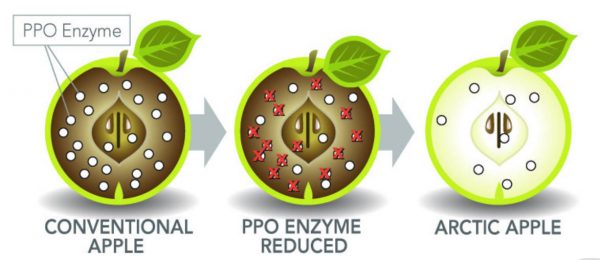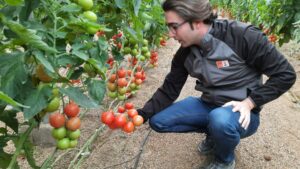The U.S. Department of Agriculture’s Animal and Plant Health Inspection Service (APHIS) has publicly shared the final version of Okanagan Specialty Fruits Inc.’s (OSF) petition seeking regulatory approval for Arctic Fuji apples, a nonbrowning variety produced through biotechnology.
In an announcement published Aug. 10, 2016, APHIS reports it has reached a preliminary decision to extend their determination of nonregulated status to OSF’s nonbrowning Arctic Fuji variety. In addition to publishing OSF’s petition, APHIS also shared their preliminary finding of no significant impact, and preliminary extended determination and plant pest risk assessment. APHIS will initiate a public comment period in the coming days.
“Over a decade of real-world field trial experience has assured us that Arctic trees have the same growing needs as conventional trees, and that Arctic apples are compositionally and nutritionally comparable to conventional apples,” says Neal Carter, OSF founder and president. “It’s not until an Arctic apple is bruised, bitten or cut that the nonbrowning benefit becomes obvious.”
In Arctic apples, gene silencing is used to suppress the apple’s expression of polyphenol oxidase (PPO), the enzyme involved in browning when the fruit is bruised, bitten or cut. This virtually eliminates PPO production, so in turn the fruit does not brown from superficial damage, but will still show discoloration from bacterial or fungal infections and rot just like any apple.
“We are pleased to see the Arctic Fuji reach the next stage of deregulation,” Carter says. “Interest in our first two distinctly nonbrowning varieties, Arctic Golden and Arctic Granny, following their approval in 2015 has shown us that the benefits of the Arctic Advantage are of great interest to the industry and consumers alike. We are confident we will see a similar response to Arctic Fuji, and many more nonbrowning varieties still to come.”
OSF’s petition contains data on the introduction and testing of the nonbrowning trait in Fuji variety apples but differs from the petition submitted for OSF’s initial varieties, Arctic Granny and Arctic Golden, because it is considered an extension. The nonbrowning trait in OSF’s Arctic Fuji variety is no longer considered unique in apples, as APHIS has previously evaluated potential impacts of this trait and how it is introduced, concluding that these varieties are just as safe for consumers and the environment as conventional apples.
OSF submitted its extended petition for nonregulated status of the Arctic Fuji to APHIS in December 2015; APHIS notified the company its petition was complete in April of this year. According to OSF, it anticipates commercial introduction of Arctic apple varieties in fall 2017.
“Our main goal is to increase apple consumption and reduce waste,” Carter says. “By removing the ‘yuck’ factor, more apples get eaten and fewer get thrown away. It helps reduce the load on the environment and families’ pocket books.”











